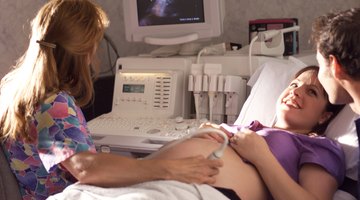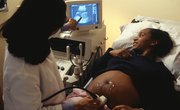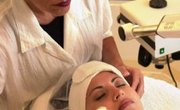Nurses have a wide variety of career options and can specialize in a number of different practice areas. A concentration in maternity care prepares nurses to work with pregnant women through the various stages of their pregnancy to labor and delivery. This can be a very rewarding career because labor and delivery nurses help women and families through one of the most difficult and joyful experiences in life. To prepare for a career as a maternity nurse, students must fulfill their core degree requirements and focus their elective coursework on topics related to family and reproductive health.
Labor and Delivery Nurse Roles
Nurses who specialize in providing direct care to patients in labor and during delivery generally have bachelor’s degrees in nursing and become registered nurses. The role of a labor and delivery nurse includes taking the woman in labor’s basic vital information, such as blood pressure, heart rate, body temperature and weight. The nurse may also perform an internal physical examination to determine the progress of the labor. Nurses also monitor the baby’s vital signs and may administer pain medication to the mother.
Core Nursing Requirements
Bachelor’s programs in nursing all have a core curriculum, which introduces students to the central issues and subjects in nursing. Many of these classes are prerequisites for upper-division classes in specialized practice areas like maternity care. Examples of core nursing classes include human anatomy and physiology, which deals with the body’s organ systems and their interaction, and pharmacology, which introduces students to principles of drug treatments and the therapeutic and adverse effects of pharmaceutical drugs. Students must complete these courses to prepare for the more advanced courses dealing with specific issues in maternity care.
Elective Courses
Most nursing programs provide students the opportunity to take elective courses in a particular area of interest. Because these electives are often advanced courses with a number of prerequisites, they are taken in the last couple of years of the degree program. With electives, students can specialize in areas such as maternity care by taking courses like the developing family and child, maternity nursing and at-risk childbearing families. These classes help students prepare for a career as a maternity nurse by providing specific instruction in the theoretical and clinical areas necessary to provide care to women in labor and during delivery.
Hospital Training Programs
For nurses who graduate with a bachelor’s degree in nursing and want to gain a further level of experience and specialization in labor and delivery nursing, some hospitals and medical centers offer post-baccalaureate residency programs. These programs focus on areas like women’s health and provide the newly qualified registered nurse with the experience and practical skills to work as a professional nurse. Labor and delivery is a major segment of these programs, but residents are also exposed to newborn nursery and postpartum issues during their residency.
Related Articles
References
Writer Bio
Kate Prudchenko has been a writer and editor for five years, publishing peer-reviewed articles, essays, and book chapters in a variety of publications including Immersive Environments: Future Trends in Education and Contemporary Literary Review India. She has a BA and MS in Mathematics, MA in English/Writing, and is completing a PhD in Education.











